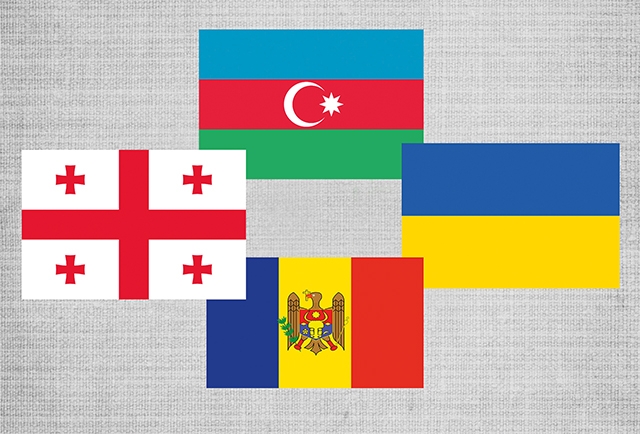EU & US Should Support GUAM. The Georgian Perspective
Op-Ed
On December 12, the Heads of Governments of GUAM (an organization for democracy and economic development) member states Georgia, Ukraine, Azerbaijan and Moldova, met in Kiyv.
During the talks, Georgia was represented by PM, Giorgi Gakharia. The Prime Ministers of Ukraine, Georgia and Moldova, Oleksiy Honcharuk, Giorgi Gakharia, Ion Chicu, as well as the Vice PM of Azerbaijan, Ali Akhmedov, discussed issues pertaining to the increase of regional cooperation. According to the joint statement, the countries agreed to expand cooperation with their partner countries and international organizations to carry out regional projects and multilateral programs of cooperation. More specifically, the states expressed the need for the use of blockchain technologies in verifying certificates of goods’ origin transported across the GUAM Member States, and the mutual recognition of Authorized Economic Operators was signed between the customs administrations. Ukraine’s PM Honcharuk said that “two documents have been signed; these are protocols of intentions in regards to the functioning of customs agencies in our countries. Enacting these two documents by our customs agencies will significantly simplify trade between us”.
This gathering might be a turning point for GUAM (initially called GUUAM). Established in 1997 following the collapse of the Soviet Union, small states near the Black Sea strove to develop cooperation to lessen dependence on Russia. It also served as one of the first regional models which linked the Black and Caspian seas, and it had a primarily economic role. At one point, even Uzbekistan was a member, which potentially allowed the GUUAM (abbreviation of the participant states: Georgia, Ukraine, Uzbekistan, Azerbaijan, and Moldova) to extend to the heart of the Central Asian region.
This was a time when Russia was relatively weak, the West seemed powerful and various visions were propounded, among them the reinvigoration of ancient silk roads.
If working effectively, the grouping might be turned into a powerful geopolitical player. For example, Ukraine controls most of the Northern Black Sea and Azerbaijan plays a powerful role as a starting point of crucial trade and a resource corridor. In between them is the Georgian bridge. Further afield, through Azerbaijan, it would be possible to reach out to the Central Asia region, even though Uzbekistan pulled out.
The GUAM grouping, though short of establishing a veritable alliance, nevertheless shares one common aim: limiting Moscow’s geopolitical influence by being able to dispose of/export their own resources to world markets circumventing Russian territory. In the late 1990s and early 2000s, the project failed to turn into a serious economic body. Russian influence gradually regained its lost positions and quite naturally the countries were unwilling to cause Moscow’s anger. Moreover, GUUAM, later GUAM, members were also dependent on Russian economic, military and, generally, political benevolence.
Back then, Russia played well to prevent major western-led projects that could circumvent its territory and pull gas and oil from the South Caucasus and Central Asia. Uzbekistan withdrew from the project in 2005 and Azerbaijan, Georgia, Ukraine and Moldova, with all their economic and military weaknesses, were unable to keep up the prospects of GUAM. Distrust towards was Russia not enough to coordinate foreign policy moves.
The Russians, quite rightly, fear that such initially loose economic projects, and among them GUAM itself, could eventually evolve into firmer entities.
As the recent summit Kyiv showed, the GUAM initiative might still be weak, but it is far from dead. Perhaps foreign support could be a defining moment. For example, for the EU and the US, which both confront Russia’s moves across the Eurasian landmass, GUAM might be a good basis for creating an interregional economic space.
This year marks the 22nd year of the grouping’s existence and it could be argued that many a geopolitical development in the Black Sea region points to a coalescing of interests among Georgia, Moldova, Ukraine and Azerbaijan. Primary among those interests is economic cooperation. A great number of infrastructural projects have been carried out which would enable these countries to establish firmer economic contacts. Another incentive is that all the member states, except for Azerbaijan, share difficult relations with Russia.
By Emil Avdaliani












